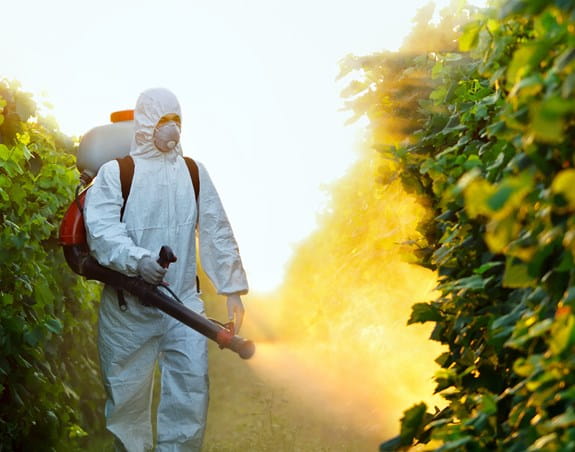Pesticides
What are pesticides?
Pesticides are chemicals used to kill or control insects, plants, rodents or other pests.
Pesticides are often used because pests can affect our health, safety or food supply. This use of pesticides is called non-cosmetic because it's needed for public health and safety.
Pesticides are also used to make lawns, gardens and other green spaces look better. We call this use cosmetic because it's not needed for health and safety.

Pesticides are a group of chemicals that include:
- insecticides – for insect control
- herbicides – for weed control
- fungicides – for control of disease caused by fungus
- rodenticides – for rodent control
- fumigants – a gas or vapour used to control insects
Pesticides and cancer
Much of the evidence on the health risk of pesticides comes from studies that look at cancer risk in people who use pesticides in their work – for example, farmers, golf course workers and pesticide manufacturers. The research shows that pesticide exposure in general (as well as exposure to specific pesticides) is linked to several types of cancer, including non-Hodgkin lymphoma, multiple myeloma, and prostate, kidney and lung cancers.
The International Agency for Research on Cancer (IARC) classifies a small number of pesticides as known carcinogens and a few others as possible carcinogens. Many of these pesticides are no longer used in Canada.
Cosmetic use of pesticides
Non-cosmetic use of pesticides
How to protect yourself and your community from pesticides at work
Read the product information about pesticides and follow the directions on the label.
Choose the least hazardous pesticide that will still be effective.
Follow work health and safety requirements. For example, make sure that you have received any necessary training and certification before selling or applying pesticides.
Wear protective equipment (such as gloves, goggles and a mask) as recommended on the pesticide label, safety data sheet or product fact sheet.
Wash your hands and face immediately after using pesticides.
Clean up spills immediately.
Get rid of empty pesticide containers by following the instructions on the label. Contact the city or town office in your area about getting rid of unused pesticides.
Reduce drift and environmental contamination. For example, add a buffer zone – leave a strip of land without pesticides next to a sprayed area.
Spray pesticides on days with all of the following weather conditions:
- a crosswind, which is wind that is blowing perpendicular to the direction you are spraying in (wind that is blowing from your left or right side, rather than from behind you or toward you from the front)
- a light wind between 1 and 8 km/h
- temperatures below 25°C
- humidity higher than 40%
Never spray pesticides when it is very windy, when there is no wind at all, when temperatures are above 30°C or when it is raining.
Post signs warning people that an area has been treated with pesticides.
Do not use the products for other uses.
Do not use more than the recommended amount.
Never burn pesticides or pour them down the drain.
Don't wear clothes at home that you wore while working with pesticides. Clothes worn at work should be washed after each use and separately from other clothes. If a piece of clothing that you wore while working with pesticides can't be thoroughly washed, talk to your employer about how to safely dispose of it.
Don't smoke, drink or eat when handling pesticides.
Don't rub your eyes or touch your mouth while working with or after using pesticides.
Don't store pesticides near food or drinks.
Don't breathe in sprays or dusts.
Don't move pesticides into a different container for storing – if you do, you or someone else might misuse them by mistake. Also, always keep the original label with safety instructions on the container.
Your trusted source for accurate cancer information
With support from readers like you, we can continue to provide the highest quality cancer information for over 100 types of cancer.
We’re here to ensure easy access to accurate cancer information for you and the millions of people who visit this website every year. But we can’t do it alone.
Every donation helps fund reliable cancer information, compassionate support services and the most promising research. Please give today because every contribution counts. Thank you.
